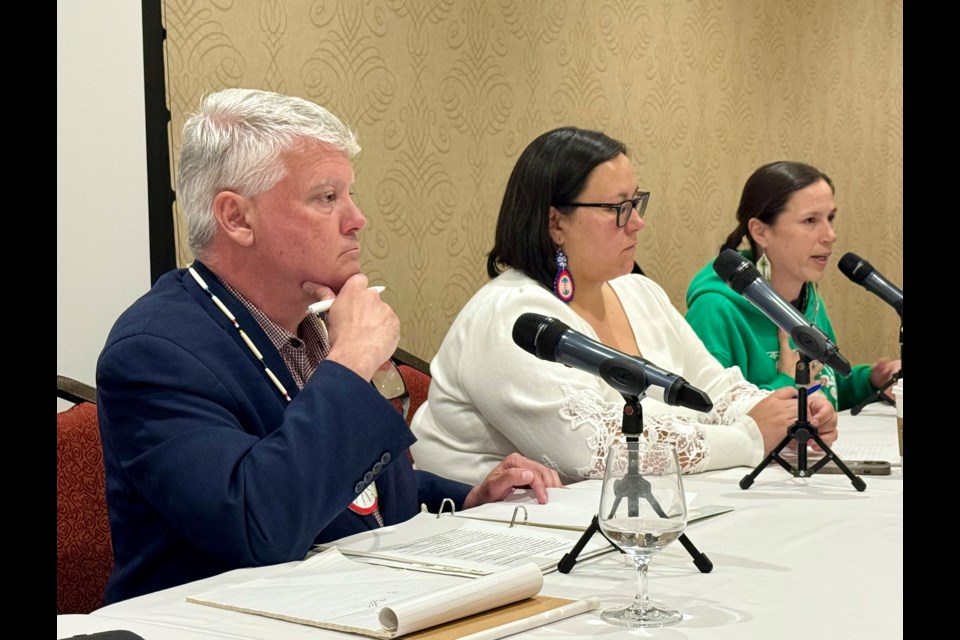With the federal election drawing near, Indigenous leaders and federal candidates came together on Thursday evening to engage and encourage the Indigenous community to vote and have their voices heard.
Held at the Delta Hotel and Conference Centre, leaders from local First Nations and beyond held an Indigenous community engagement session along with NDP candidate Laura Mayer, Green candidate Robyn Eshkibok, and Liberal candidate Terry Sheehan.
Dozens of community members came out to the event, where leaders fielded questions from the crowd and rallied for the community to engage in the political process. Leaflets containing local statistics and party campaigns were distributed to attendees as they entered the venue.
The event was broken into two sections, with Indigenous leaders – including Mayer and Eshkibok – leading the first session, and local federal candidates fielding questions during the second.
“I thank everybody who's at this table here, everybody who's in this room, because when my mother was born as a First Nations woman, she wasn't eligible to vote, and now she's at the point where she gets to see her daughter run as a Member of Parliament,” said Mayer.
“That happened in one lifetime. Imagine what we can do in another.”
Several leaders highlighted how, given Canada’s legacy of colonialism, many Indigenous people can feel disenfranchised by the political process – stressing the need for them to make their voices heard nonetheless.
“I hear often, and I don't blame First Nations people when I hear them say, ‘Why should we vote for them? It's not our government. It's a colonial government,’” said Scott McLeod, Anishinabek Nation Lake Huron Regional Chief.
“I agree – however, we must look at this as an opportunity to choose who our treaty partner is going to be, not our prime minister. It's not our prime minister. We're choosing a partner to uphold the treaty that hasn't been upheld since the day it was signed.”
Pointing to the fact there are “allies who are willing to stand up beside us and fight for us,” McLeod stressed that “we need to stand with them – we need to vote.”
A variety of issues were raised by the panel, from Eshkibok’s concerns about the Ring of Fire being developed without Indigenous voices at the table, to Glen Hare’s concerns about expanded strong mayor powers, plans to build homes, and a conspicuous lack of Indigenous Peoples in party platforms.
“They want to build millions of homes – for who? Their platforms don’t mention First Nations,” said Hare, a former Ontario regional chief. “We’ve got to go get out there and vote so you can fight the fight with us.”
One crowd member asked about funding for Indigenous friendship centres, adding he hopes to take a group of people out to learn to hunt.
“A lot of people in this community have not learned how to hunt yet, and I've been doing that my whole life,” he said.
“I thought, ‘You know what? This could be an opportunity to take some people out and teach them how to do this stuff.’”
“That's where the Green Party is not only advocating, but pushing that these programs to stay in place, but we need more of these spaces,” responded Eshkibok.
During the candidates discussion, Sheehan clarified that he – and the Liberal Party – support expanded funding to Indigenous friendship centres.
“Right in our platform, it says that we will increase the funding for Indigenous friendship centres,” he said. “I've been to the Indigenous friendship centre many times, on many occasions, for different things, and I know the great work you do.”
Another attendee expressed desire for Indigenous people to “have our own judicial system,” for family or criminal matters.
“Your suggestion is an excellent suggestion, and that is something I truly support, both in the judiciary, but also in community safety and policing,” Sheehan responded. “We need to get to that point.”
Eshkibok agreed that an Indigenous lens should be applied to these issues, suggesting land-based education, treatment centres, and more.
“Only we know what it takes to care for our own, and that includes, obviously, our allies too,” she said.
“In this good way, we know how to bring forth that feeling and prevent recidivism – that's where we would keep implementing the programs that need to be coming forth.”
Conservative candidate Hugh Stevenson did not attend Thursday’s event – which was not missed by attendees.
“I noticed that there's no Conservative here tonight, and I have to say as probably the first Indigenous woman on the ballot in the Algoma–Manitoulin–Kapuskasing election, it was typical that the Conservatives wouldn't show up,” said Lorraine Rekmans, former president of the Green Party of Canada.
